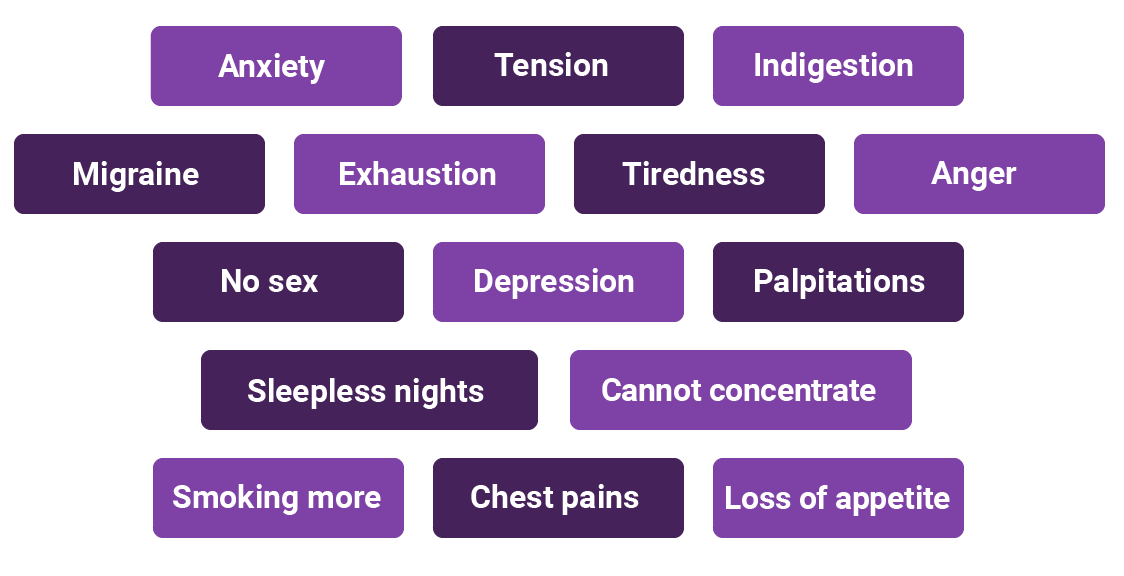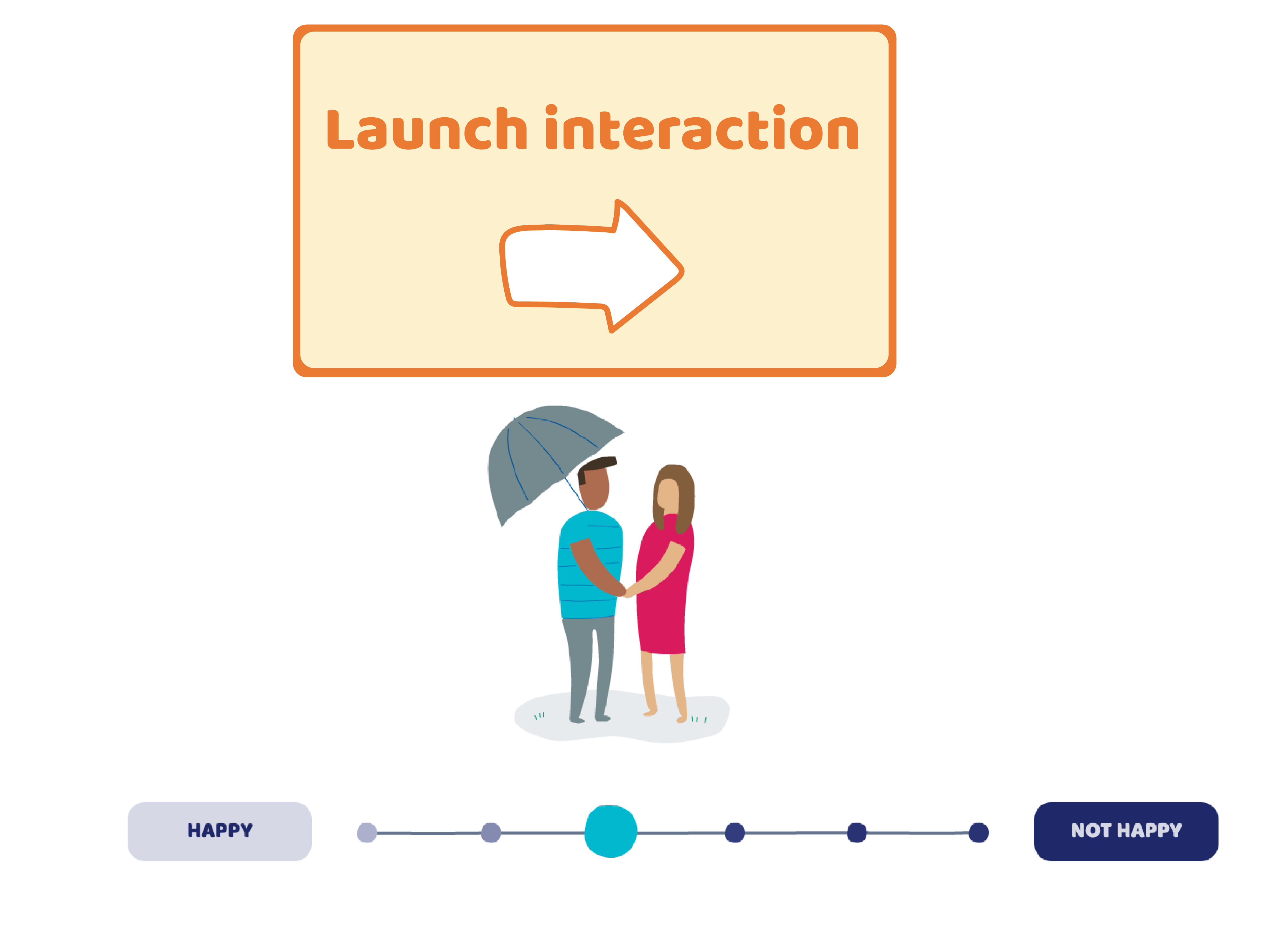The purpose of this session:
- To raise parents’ awareness about the sources of their stress and how that can affect their relationship.
- To identify the causes of stress and enhance the couple’s coping skills.
- Learn more about the evidence base for this section.
As this resource is being evaluated, we ask parents to answer a number of questions at the beginning and throughout the course. Please encourage parents to complete these so we can find out more about the effectiveness of this resource. The learning material starts on Page 2.
Page 2: What is stress?
How often do you find yourself feeling stressed? A couple of times a week? Every day?
There are times in all our lives when we feel stressed. In those times, we might do things that are bad for us, like arguing with our partners, or drinking more alcohol.
Because of this, it’s helpful to know where stress comes from and how to deal with it in a healthy way.
So, how does stress come about? As the following clip shows, it has to do with your DEMANDS and RESOURCES.
Now think about the stress in your life. Based on the clip you have just watched, think about these questions:
- What are your DEMANDS? What kinds of things can cause you stress?
- What are your RESOURCES? Which ways of coping do you tend to rely on?
- What happens when your DEMANDS outweigh your RESOURCES?
Remember that ALCOHOL might feel like a way of coping, but it can sometimes end up causing more stress.
FACILITATOR NOTES
Discuss the couple’s current sources of stress and their coping resources. Recap on the questions:
- What kinds of things can cause you stress?
- Which ways of coping do you tend to rely on? What sort of things can you do and what support do you have that help you to cope day to day?
- What happens when you feel overwhelmed by stress?
Emphasise that alcohol might feel like a way of coping, but it can sometimes end up causing more stress.
Page 3: How stress comes about
Stress isn’t the same for everyone. Something that you find easy to cope with might be very stressful for your partner. It depends on YOU and your RESOURCES.
As the next clip shows, you might even cope better or worse depending on how you feel on the day.
Watch the next clip:
FACILITATOR NOTES
- Talk about how stress can be exacerbated by how we are feeling and the way we respond to it.
This helps parents reframe some of their initial thoughts about the source of their stress.
Page 4: Major events and daily hassles

FACILITATOR NOTES
- This illustration shows how daily hassles can build up if not addressed.
Ask the couple if they have been able to identify what adds to their stress on a daily basis. What are the big life changes they have experienced?
Emphasise how important it is to talk about the situation and to resolve it before it gets too big.
Page 5: How does stress affect you?
Think about a time recently when you have been stressed. What was it like for you?
The effects of stress can include:
- Thoughts
- Feelings
- Actions
Sometimes, stress can lead to actions that may make things even worse – like avoiding our friends, and smoking or drinking more.
Take a look at these SIGNS OF STRESS. Have a think about which of these you've experienced in the last few weeks.

Evidence and notes for you
Facilitate a conversation about how stress affects the couple – what are their symptoms and how does that make them feel?
Explain that stress can affect us physically and mentally. Anxiety, tension, irritability, and tiredness can all make us short-tempered, which is often why arguments erupt.
Page 6–7: Stress and relationships
Sometimes this stress will come from INSIDE your relationship, and sometimes it will come from OUTSIDE your relationship.

As a couple, and as parents, there will be stressful times when you need to support each other.
INSIDE STRESS is stress that is directly connected to your relationship with your partner. It might include arguments, having different goals, problems with your children, or anything else that affects you both, like one of you using alcohol.
OUTSIDE STRESS is stress that comes from outside your relationship. It might include stress with money, work, friends, in-laws, or anything else.
It can seem like these kinds of stress have nothing to do with your relationship, but that isn’t always true. Sometimes, these OUTSIDE stresses can spill over into your relationship and become INSIDE stresses.
There are four main ways that OUTSIDE STRESS can spill over into your relationship:
- TIME: When you or your partner have a lot of stress in your life, you have less time for each other.
- COMMUNICATION: If you are stressed, you may argue more or snap at each other.
- HEALTH: Stress can be bad for your body. You may feel unwell and want to be alone. Stress can even make you less interested in sex.
- BEHAVIOUR: When you are stressed, you might behave in a way you wouldn’t normally. Stress can make you impatient or grumpy, and less willing to see things from your partner’s point of view.
Stress can also be linked with DRINKING ALCOHOL. In the short term, having a drink can feel like it’s helping with stress. But the original problems will still be there the next day and you might feel less able to deal with them.
Watch Darren’s story:
FACILITATOR NOTES
- Assess their understanding of how stress from outside their relationship – such as money or in-laws – can spill over into their relationship.
Stress spills over into the relationships in four main ways – time, communication, health, and behaviour. Have they been able to identify the ways stress spills over into their relationship?
The clip shows how easy it is to rely on alcohol as a way of coping with stress, and how this can become hazardous.
Emphasise the main message from Darren – can they talk about their stress with each other?
Page 8: Where does your stress come from?
Where does YOUR stress come from? The STRESS TARGET can help you think about which areas of your life are causing you stress.
Have a look at the list of words below. Imagine where you might place each one on the target, depending on how much stress it is causing you. The more stressful it is, the closer to the centre it would go.
Something really stressful would go in the middle. Something that’s not stressful at all can stay off the target.


When stress is all piled up, you can imagine that it all gets clustered around the middle. At times like these, it can be hard to think about anything else.
You can also ask your partner to do their own stress target: How do your stress targets compare? Are you both stressed about the same things?
FACILITATOR NOTES
- Ask the couple if they have identified where their stress comes from. Are their stress targets the same or different? What does this mean to them and what they might do about it? This encourages the couple to reflect on how and why they become stressed.
Page 9: Check in – key messages
You’re making great progress. Well done! In the rest of this section, you will learn more about how to cope with stress as a couple.
You have already learned a lot about stress. What key messages can you remember?
- Stress can affect you, your relationship, and your children.
- Stress happens when DEMANDS outweigh RESOURCES.
- You may react differently to stress, depending on how you feel on the day.
- Stress from DAILY HASSLES can be just as hard to cope with as stress from MAJOR EVENTS.
- Stress can affect you through your THOUGHTS, FEELINGS, and ACTIONS.
- Stress can come from INSIDE or OUTSIDE your relationship.
- Stress from outside can spill over into your relationship.
- Drinking ALCOHOL can often make stress worse, not better.
How might you and your partner use these lessons in your lives? What do you think would change if you do?
FACILITATOR NOTES
- Recap on what the couple have learned so far. Emphasise the key messages of this section:
- Stress is often detrimental to the couple relationship and when this results in an increase in destructive conflict then this can be harmful to children.
- Stress happens when DEMANDS outweigh RESOURCES.
- Stress from DAILY HASSLES that accumulate can be just as hard to cope with as stress from MAJOR EVENTS.
- The source of stress can be external to the relationship but spill over into relationship issues.
- Drinking ALCOHOL can often make stress worse, not better.
Page 10: Coping with stress together
The next few pages are all about how you can cope with stress together, without relying on alcohol.
If someone you love is under stress, you will probably want to help them feel better. When you and your partner both know the best ways to support each other, it can be easier to find healthy ways to deal with stress, and let go of unhealthy ways of coping, like drinking alcohol.
This can make things better for you and your partner, as well as your children.
You will learn about:
- The best way to support each other through stress.
- How we show that we are stressed.
- The five rules of talking about stress.
FACILITATOR NOTES
- This page introduces parents to the remainder of this section, focusing on ways of coping with stress without using alcohol.
Page 11: How ‘my’ stress becomes ‘our’ stress
When you or partner are stressed, try not to think of it as MY STRESS or YOUR STRESS. Instead, think of it as OUR STRESS – something for you to deal with together.
This clip shows why it’s best to work together as a couple, even when only one of you is going through a hard time.
Watch the next clip:
FACILITATOR NOTES
- Encourage parents to think of their stress as shared stress – something they deal with together rather than from an individual perspective.
This is an effective way of improving relationship quality and stability.
Pages 12-13: Recognising stress and Talking about stress
How do you know when your partner is stressed? How does your partner know when you are stressed?
Knowing how to recognise stress is the first step to being able to support each other.
We might express stress VERBALLY, by talking about it. But we might also express it NON-VERBALLY, through our body language and facial expressions.
What kinds of things does your partner do that let you know they are stressed?
How do you tell your partner about your stress?
If you’ve had a hard day, you might just want to talk about what happened. This can help you get things off your chest, but it isn’t always enough. Your partner might know what happened, but they may not know how it made you feel.
ACTIVITY 1: How do you let your partner know that you are stressed?
Think about a recent time when you felt stressed. What did you do to let your partner know?

ACTIVITY 2: How does your partner let you know that they are stressed?
Think about a recent time when your partner seemed stressed. What did they do to let YOU know?

FACILITATOR NOTES
- Partners will often use a variety of ways to let their partner know they are stressed – not all of them helpful.
This activity should help the couple identify their own stress behaviours and reflect on whether or not they are helpful in communicating stress to their partner.
Page 14: How to talk about stress
How do you and your partner talk to each other about your stress and worries?
The next time you’re talking about stress, try to stick to the five rules. They can help you have better conversations with your partner.
Here is a helpful reminder of the five rules:
- Stick to the facts
- Say how you feel
- Really listen
- Reflect back
- Ask for support
FACILITATOR NOTES
- Recap on the learning from the clip and revisit the rules for communicating stress:
- Stick to the facts
- Say how you feel
- Really listen
- Reflect back
- Ask for support
Additional activity 1 – ‘I’ statements
- Encourage parents to try using ‘I’ statements, focusing on their feelings rather than using ‘you’ statements that can come across as an accusation or blame. Using an ‘I’ statement helps a person become assertive without making any accusations.
- "I feel…"
- "When you…"
- "Because…"
- "What I need is…"
- It may feel very strange for parents to approach their conversations in this way but with practice it can really help.
Page 15: Supporting each other
When your partner has a problem, you can offer support in two different ways:
1. EMOTIONAL SUPPORT: This is when you show that you have understood.
2. PRACTICAL SUPPORT: This is when you offer ways of solving the problem.
EMOTIONAL SUPPORT is important because it shows your partner that you are there for them. It is always better to listen first without offering advice.
- Listen to your partner’s feelings.
- Show that you understand.
- Give them a confidence boost: “You can do it!”
- Stick together.
- Reassure them.
This doesn’t mean that you can’t offer PRACTICAL SUPPORT at all, but you should try to offer EMOTIONAL SUPPORT first.
The next two clips will show you how this works.
Ada tells Jason about a problem. In the first clip, Jason offers PRACTICAL SUPPORT without offering emotional support.
Watch the first clip:
Jason doesn’t offer much emotional support. He seems impatient and annoyed. Right at the start, he says: “It’s them that’s meant to be dealing with it”.
Then he dismisses the problem: “It’s probably just a phase”.
When Ada comes up with her own solution, Jason doesn’t really want to help. He says: “There’s no point in overreacting”.
Even when Ada tells him how upset she is, he ignores her. Instead, he offers this practical support, which isn’t very helpful: “Maybe we should start looking for a different nursery”.
Can you see from Ada’s body language that this isn’t the response she was hoping for?
Now watch the second clip. This time, Jason offers EMOTIONAL SUPPORT first.
This time, Jason is a much better listener. He turns towards Ada and shows he understands: “Oh no”.
Ada then has a chance to talk about how she feels. Jason comforts her: “I’m sorry you had to deal with that on your own”.
Jason asks questions to find out more about the problem: “What do you think is causing it?”
He offers reassurance: “You’re not useless”.
Jason does offer practical support, but only after he has listened to Ada. When Ada suggests seeing the doctor, Jason says: “Let me book it”.
Can you see that Jason’s response was more helpful this time? Ada feels better supported emotionally, so it’s easier for her to accept the offer of practical support.
What else do you notice about the way Jason and Ada communicate with each other?
- What could you do to help your partner feel more supported in future?
- What did Jason do in the second clip that you might be able to try?
- What would make it easier to do this? What would make it harder?
FACILITATOR NOTES
- In the first clip, Jason offers Ada practical support. In the second clip, he offers emotional support first.
Ask the couple if they were able to see the difference when Jason offered emotional support to Ada. Could they identify the steps Jason took to understand Ada’s point of view? Talk about how Jason and Ada were able to sort things out together – a shared response.
Find out if the couple have had an opportunity to offer emotional as well as practical support. If they have found this difficult, there is an additional activity you can use to help them improve their listening skills.
Additional activity 2 – The funnel method
- Ask the couple to tell you about a recent time they felt stressed, focusing on:
- The problem
- Thoughts and feelings
- Personal level
You will take the part of the listening partner, modelling relational skills – empathy, understanding, and acknowledging the other person’s feelings.

- Listening in this way makes it easier to offer emotional support first rather than jumping to offer practical support or advice. In a supportive relationship, stress is shared and understood, and the couple are able to solve problems more effectively.
If both parents are stressed, they may need to take turns using the funnel method so they can support each other. If you are only working with one parent, they can still learn this technique and role model these skills to the other parent.
Pages 16–18: Wrapping up Section 1
Now it’s time to set some goals. A goal can be a thing you want to happen, or a way you want to be. Goals are a good way to make sure you use the new skills you are learning.
How to set goals
What would you like to do differently? You can set goals by going to your dashboard and clicking on ‘manage’.
Then you can either choose your own goal or pick one from our list:
- Make eye contact to show I understand.
- Comfort my partner when they are upset.
- Try to listen more.
- Ask my partner questions to find out more.
- Reassure my partner.
The most important this is to PRACTISE. Whatever goals you choose, try them out over the next few weeks. The more you practise, the better you will get.
Well done! You have reached another milestone. In the final section, you will learn more about how to handle difficult conversations with your partner.
What key messages can you remember? You have already learned a lot about dealing with stress:
- MY STRESS or YOUR STRESS is usually OUR STRESS.
- There are lots of different ways to RECOGNISE stress.
- Sometimes we can tell someone is stressed through their BODY LANGUAGE.
- Give EMOTIONAL support before PRACTICAL support.
- The five rules for talking about stress:
- Listen to your partner’s feelings.
- Show that you understand.
- Give them a confidence boost: “You can do it!”
- Stick together.
- Reassure them.
How might you and your partner could use these lessons in your lives? What do you think would change if you do?
This might be a good time to take a breather and think about the stuff you've learned so far.
When you're ready, come back and get ready for Section 2.
FACILITATOR NOTES
Check in with the parents to see how they are progressing with their goals. If they haven’t set a goal yet, you can help them to choose one now. They can do this by going to the dashboard and clicking on manage.
They can choose their own goal, or you can suggest one based on their experiences so far. Some suggestions:
- Make eye contact to show I understand.
- Acknowledge how my partner is feeling.
- Comfort my partner when they are upset.
- Listen more.
- Ask my partner questions to find out more.
- Reassure my partner.
You can review their progress at the start of the next section.
Please encourage parents to complete the questions at the end of Section 1, on Page 17. This will help us evaluate the effectiveness of the programme.
Recap on what the couple have learned so far. Emphasise the key messages of this section:
- MY STRESS or YOUR STRESS is usually OUR STRESS.
- There are lots of different ways to RECOGNISE stress.
- Sometimes we can tell someone is stressed through their BODY LANGUAGE.
- Give EMOTIONAL support before PRACTICAL support.
- The five rules for talking about stress:
- Listen to your partner’s feelings.
- Show that you understand.
- Give them a confidence boost: “You can do it!”
- Stick together.
- Reassure them.









